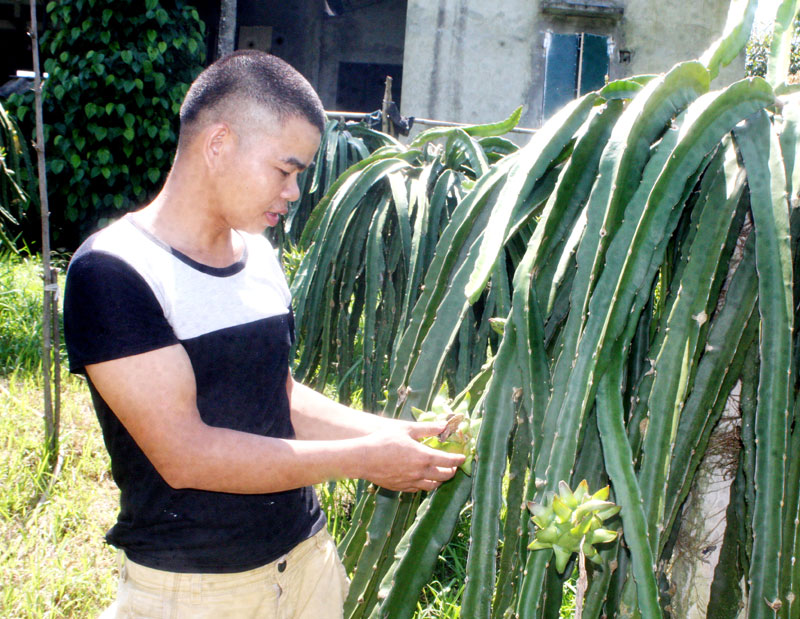
(HBO) – Thanks to brave transformation of the area of the garden land, unstable rice fields to grow red dragon fruit, Mr. Bui Van Thanh, in Doi Bung 2 village, Dong Lai Commune (Tan Lac) has achieved unexpected results and opened a new direction of rich promising.

Mr. Bui Van Thanh is taking care of his
family's red dragon fruit garden.
Realizing the potential of this plant, Mr.
Thanh boldly borrowed money, planting more than 200 roots in the field. Up to
now, his family has over 300 dragon fruit roots, and all have harvested. Last
year, his family earned about 30 million VND for fortune-telling fruit. From
the beginning of this year, he used the knowledge he learned in caring dragon
fruit for higher productivity. So far, his family has sold more than 2 tons of
dragon fruit, at the price of 25,000 VND / kg, bringing in the income of over
50 million VND.
On the day we visited his garden, traders
came directly to his garden to collect more than 5 tons of dragon fruit of Mr.
Thanh’s family. In the garden, there were only a few fruit of small size left, Mr. Thanh invited us to try eating.
Admittedly, in addition to the eye-catching red color, this round dragon fruit
is sweeter than white dragon fruit. With an area of 2,500 m2 of dragon fruit,
since the beginning of this year, it has brought an income of more than 50
million VND for his family. This figure is likely to increase as the dragon
fruit continues to be harvested from now to the end of the year. Obviously, the
efficiency that this plant brings is higher than that of maize, rice and some
other crops. Besides selling fruit, Mr. Thanh is actively make reproduction of
this plant to provide seedings for local people, and preparing to expand the
area. "My family is making reproduction of this plant and adding more
concrete piles to plant 200 more dragon fruit roots.This time, I will plant in
a new style, making standees for dragon fruit to climb, so as to save space and
get higher productivity."Mr. Thanh said.
With a stable price, high economic efficiency
and low market supply, the model of planting red dragon fruit of Mr. Bui Van
Thanh's family, in Doi Bung 2 Hamlet, Dong Lai Commune (Tan Lac) is the new
potential direction, opening the new way for the family to become rich.
According to data from the Hoa Binh Provincial Party Committee, the industrial production index for the first six months of 2025 is estimated to have increased by 20% compared to the same period last year. This marks the highest year-on-year growth rate for this period since 2020.
In the first six months of 2025, Hoa Binh province’s export turnover was estimated at 1.145 billion USD, marking an 18.11% increase compared to the same period in 2024. Import turnover was estimated at $ 804 million, a 17.15% increase, which helped the province maintain a positive trade balance.
The lives of the ethnic minority farmers in Tan Lac district have gradually improved thanks to the new directions in agricultural production. This is a testament to the collective strength fostered through the professional associations and groups implemented by various levels of the district’s Farmers’ Union.
With the motto the "product quality comes first,” after nearly one year of establishment and operation, Muong village’s Clean Food Agricultural and Commercial Cooperative, located in Cau Hamlet, Hung Son Commune (Kim Boi district), has launched reputable, high-quality agricultural products to the market that are well-received by consumers. The products such as Muong village’s pork sausage, salt-cured chicken, and salt-cured pork hocks have gradually carved out a place in the market and they are on the path to obtaining the OCOP certification.
In the past, the phrase "bumper harvest, rock-bottom prices" was a familiar refrain for Vietnamese farmers engaged in fragmented, small-scale agriculture. But today, a new spirit is emerging across rural areas of Hoa Binh province - one of collaboration, organisation, and collective economic models that provide a stable foundation for production.
Maintaining growing area codes and packing facility codes in accordance with regulations is a mandatory requirement for agricultural products to be eligible for export. Recently, the Department of Agriculture and Environment of Hoa Binh province has intensified technical supervision of designated farming areas and packing facilities to safeguard the "green passport" that enables its products to access international markets.



